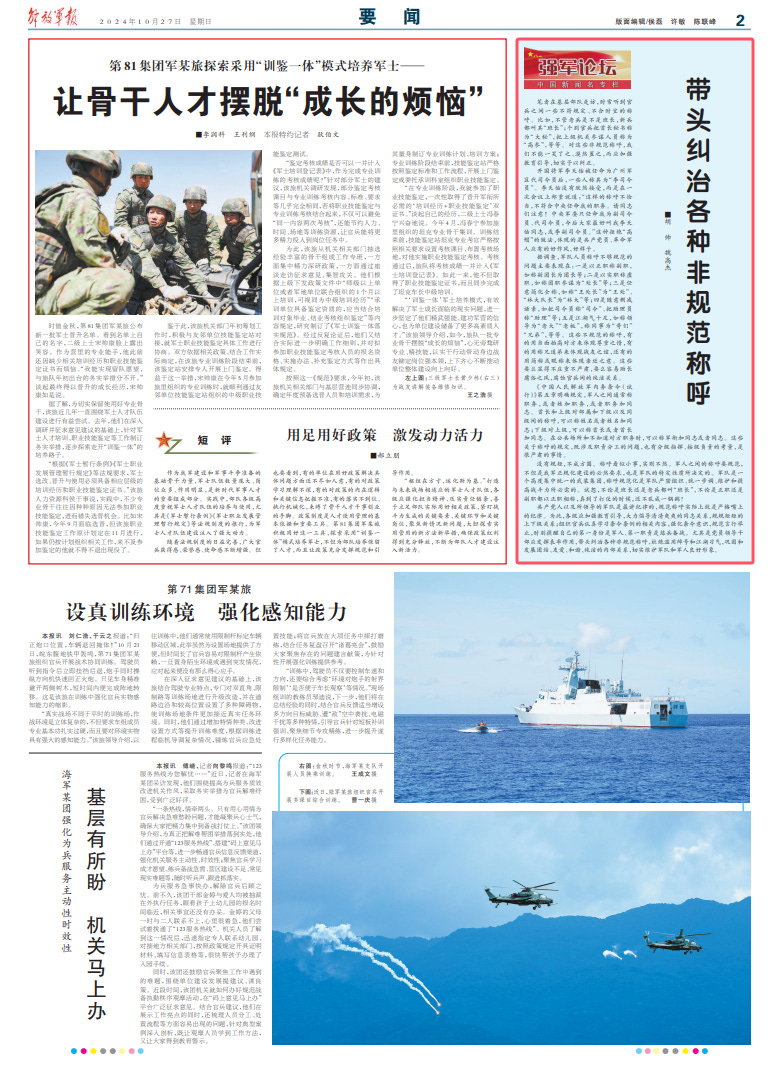PLA Daily tells military to address one another formally
The official newspaper of China's military says informal address lack professionalism, promote informality, and can erode the respectful relationships among service members.
The People’s Liberation Army Daily ran a short commentary yesterday (October 28) that’s been circulating in Chinese media.
带头纠治各种非规范称呼
Taking the Lead in Correcting Informal Forms of Address
by 胡帅 魏高杰 Hu Shuai and Wei Gaojie
The authors, during visits to grassroots military units, frequently hears service members using titles that are either unofficial or inappropriate. For instance, regardless of whether a veteran holds the position of squad leader, new soldiers often refer to them as “squad leader.” In some cases, individuals refer to a superior’s secretary as “the chief secretary” and to staff officers from higher-level units as “senior advisors.” These informal titles should not be merely dismissed or ignored; rather, we should strengthen education and guidance to address and correct them.
When General Li Tianyou, at the beginning of the People’s Republic of China, was appointed Acting Commander of the Guangzhou Military Region, some started addressing him as “Commander Li.” However, Li did not accept this title casually. During a meeting, he solemnly stated, “This title is inappropriate and does not reflect the position assigned to me by the central authority. Please take note! The Central Military Commission has only appointed me as Deputy Commander and Acting Commander. Henceforth, I should be addressed as Comrade Li Tianyou or Deputy Commander Li.” This refusal to accept an inflated title demonstrates the admirable qualities and integrity that a Communist Party of China member and revolutionary soldier should embody.
A survey reveals that informal titles within the military typically fall into five categories: 1) using the title of a principal position for a deputy, such as calling a deputy regiment commander a “regiment commander”; 2) using functional roles as if they were formal positions, such as referring to a regimental-level staff officer as a “director”; 3) oversimplifying formal titles, like addressing Wang-Chu-Zhang (“Director Wang”) simply as Wang-Chu or Lin-Da-Dui-Zhang (“Captain Lin”) as Lin-Da; 4) arbitrarily omitting parts of titles, such as shortening Si-Ling-Yuan (“commander”) to Si-Ling or Zhu-Li-Yuan (assistant) to Zhu-Li; and 5) using overly informal, colloquial language, such as calling leaders “boss” or “chief” and colleagues “bro” or “buddy.” These informal titles, in some cases, are intended to show respect by elevating a person’s perceived status, in others, to convey camaraderie, and in still others, to express familiarity through abbreviations or nicknames. However, such titles often lack professionalism, promote informality, and can erode the respectful relationships among service members.
Chapter 5 of the “PLA Internal Regulations (Trial)” clearly specifies that service members should use official titles, the surname followed by the title, or the title followed by “comrade.” Superiors may address subordinates and peers by name or as “comrade,” while subordinates should refer to superiors as “commander” or “commander comrade.” In public or when a title is unknown, soldiers should use rank plus “comrade” or simply “comrade.” These regulations on addressing one another are not merely formalities; they reflect a structure of command responsibility and accountability, which is a matter of utmost seriousness.
Discipline is foundational to military order. Appropriate forms of address are not only essential for formalizing our armed forces but are also dictated by the military’s unique character. The military is a highly unified organization, and standardized addressing is crucial for effective organization, coordination, and combat readiness. Imagine a battlefield where all veterans are called “squad leader” or where deputies are addressed as if they held principal roles; such confusion would lead to chaos. As the Communist Party of China and its armed forces value discipline above all, standardizing forms of address is an essential part of enforcing verbal discipline.
To this end, all levels should enhance education and guidance, actively promoting straightforward comradely relationships and maintaining respectful superior-subordinate dynamics. Military personnel should thoroughly study the relevant regulations, strengthening their awareness, standardizing both language and conduct, and constantly reminding themselves that their primary identity is as soldiers, with their foremost duty being training and combat readiness. Communist Party of China leaders should lead by example, actively correcting informal addresses, eliminating nicknames and colloquial expressions, and fostering a united, amicable, harmonious, and respectful internal environment. This commitment is essential to upholding the integrity and positive image of the military and its personnel.


